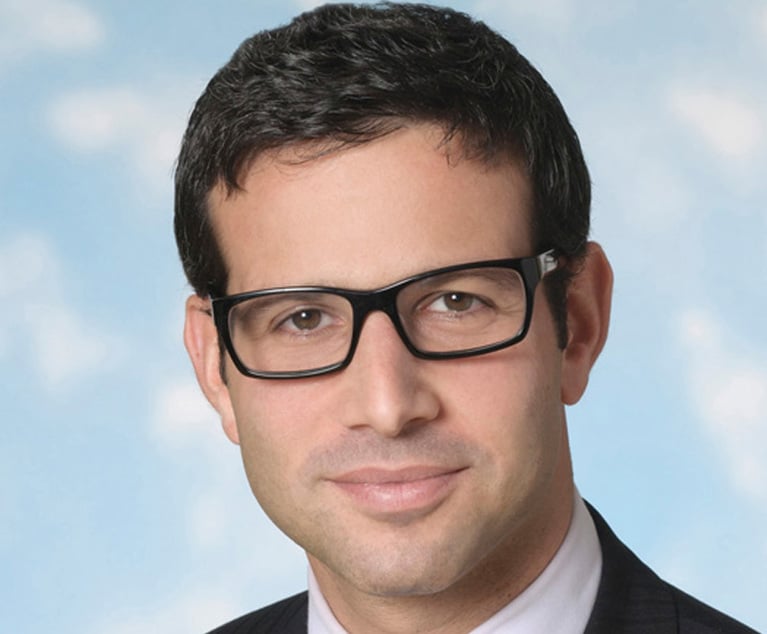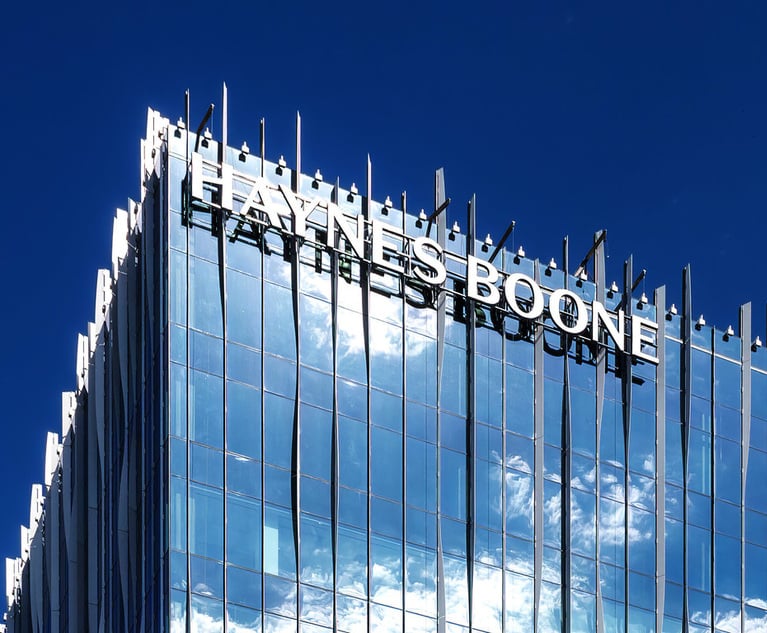 Trinity Industries legal department. Front row, from left: Bryan Stevenson, Jared Richardson, Matt Pittman, Greg Stimmel. Back row, from left: Justin Allen, Mark Elmore, Ed Chapline, Theis Rice, Sarah Teachout, Scott Ewing.
Trinity Industries legal department. Front row, from left: Bryan Stevenson, Jared Richardson, Matt Pittman, Greg Stimmel. Back row, from left: Justin Allen, Mark Elmore, Ed Chapline, Theis Rice, Sarah Teachout, Scott Ewing.Legal Department of the Year 2018: Trinity Industries Inc.
Trinity is a diversified industrial company that owns businesses providing products and services to the energy, chemical, agriculture, transportation and construction sectors.
August 31, 2018 at 06:00 AM
5 minute read
In-house lawyers at Trinity Industries Inc. worked closely with Trinity's outside counsel to overturn a more than $663 million False Claims Act judgment against the Dallas-based company after it was accused of defrauding the government over its highway guardrail system.
Trinity is a diversified industrial company that owns businesses providing products and services to the energy, chemical, agriculture, transportation and construction sectors. Sarah Teachout, a Trinity vice president and the deputy general counsel, said the company has about a dozen lawyers in its legal department.
The company had been accused of fraud for failing to disclose to regulators that it had made changes in its guardrails that critics argued made them more dangerous when cars hit them at certain angles. Joshua Harman, a competitor, had sued Trinity on behalf of the government under the qui tam provisions of the FCA. The suit, which Harman filed in 2012, was tried in the U.S. District Court for the Eastern District of Texas in Marshall.
In September 2017, the U.S. Court of Appeals for the Fifth Circuit threw out the judgment in United States ex rel. Harman v. Trinity Industries, which Trinity lawyers said was the largest in the history of the FCA in which there was no settlement.
“It was really a joint effort with our outside counsel,” Theis Rice, a Trinity vice president and its chief legal officer, said of the case.
Lawyers from Gibson, Dunn & Crutcher, Akin Gump Strauss Hauer & Feld and Bartlit Beck Herman Palenchar & Scott represented Trinity in Harman. James Ho, who led Gibson Dunn's appellate practice and now sits on the Fifth Circuit, argued the case on appeal.
Rice said that Teachout had managed the outside counsel and the in-house lawyers working on Harman on the day-to-day basis, as well as in the strategic planning.
Scott Ewing, associate general counsel at Trinity, worked on Harman and said the Fifth Circuit found his company had not made a false claim about its guardrail system in that the guardrails had been installed throughout the United States with the government's approval.
“When the government, at appropriate levels, repeatedly concludes that it has not been defrauded, it is not forgiving a found fraud—rather it is concluding that there was no fraud at all,” Senior Judge Patrick Higginbotham wrote for the three-judge panel that heard the case.
The Fifth Circuit based its decision on the strict materiality requirements that the U.S. Supreme Court set out in Universal Health Services v. United States ex rel. Escobar in 2016. The appeals court concluded that Trinity had no liability under the FCA because the government had continued to pay for the company's guardrails, showing that any deviations in the rails were not material.
If Harman had not been reversed by the Fifth Circuit, it could have had implications for other companies.
“In our view, it would be a very negative precedent, not just for Trinity but for others,” Teachout said.
Michael Warnecke, a litigation partner in Akin Gump in Dallas, offered the following comments about the in-house lawyers involved in the Harman case in an email:
“Trinity's in-house legal team didn't set out to win a landmark victory, to be heralded in the press or even to set a precedent surely to be cited in False Claims Act cases for years to come. Rather, they came to work every day with a singular focus on doing what they believed was the right thing to do for their team, their employees and their shareholders: proving that no fraud was committed in this case.
“That the Trinity team showed an amazing degree of fortitude under circumstances that may have caused others to back down. The resulting victory is a testament of that commitment. “That the Trinity team never loses sight of the big picture while zooming in on the important details is particularly impressive. This is true no matter how many matters they juggle in multiple jurisdictions.”
The 2014 adverse judgment in Harman was part of a massive legal juggernaut that the company and its lawyers faced, including a federal criminal investigation, multiple purported securities class actions, multiple shareholder derivative suits, purported class actions by government purchasers in three states and Canada, and products liability cases across the country, to name a few of the problems.
“There was a lot of copycat litigation that took place after that jury verdict,” Teachout said. Rice said that while the legal department was handling the Harman litigation, it also had to cope with its normal transactional work and other more routine litigation.
“We continued to run our business,” he said.
This content has been archived. It is available through our partners, LexisNexis® and Bloomberg Law.
To view this content, please continue to their sites.
Not a Lexis Subscriber?
Subscribe Now
Not a Bloomberg Law Subscriber?
Subscribe Now
NOT FOR REPRINT
© 2025 ALM Global, LLC, All Rights Reserved. Request academic re-use from www.copyright.com. All other uses, submit a request to [email protected]. For more information visit Asset & Logo Licensing.
You Might Like
View All
Kirkland's Daniel Lavon-Krein: Staying Ahead of Private Equity Consolidation

Vinson & Elkins: Traditional Energy Practice Meets Energy Transition
4 minute read
Advising 'Capital-Intensive Spaces' Fuels Corporate Practice Growth For Haynes and Boone
4 minute read
Get to Know Texas Lawyer's Attorney of the Year Finalists
Trending Stories
Who Got The Work
Michael G. Bongiorno, Andrew Scott Dulberg and Elizabeth E. Driscoll from Wilmer Cutler Pickering Hale and Dorr have stepped in to represent Symbotic Inc., an A.I.-enabled technology platform that focuses on increasing supply chain efficiency, and other defendants in a pending shareholder derivative lawsuit. The case, filed Oct. 2 in Massachusetts District Court by the Brown Law Firm on behalf of Stephen Austen, accuses certain officers and directors of misleading investors in regard to Symbotic's potential for margin growth by failing to disclose that the company was not equipped to timely deploy its systems or manage expenses through project delays. The case, assigned to U.S. District Judge Nathaniel M. Gorton, is 1:24-cv-12522, Austen v. Cohen et al.
Who Got The Work
Edmund Polubinski and Marie Killmond of Davis Polk & Wardwell have entered appearances for data platform software development company MongoDB and other defendants in a pending shareholder derivative lawsuit. The action, filed Oct. 7 in New York Southern District Court by the Brown Law Firm, accuses the company's directors and/or officers of falsely expressing confidence in the company’s restructuring of its sales incentive plan and downplaying the severity of decreases in its upfront commitments. The case is 1:24-cv-07594, Roy v. Ittycheria et al.
Who Got The Work
Amy O. Bruchs and Kurt F. Ellison of Michael Best & Friedrich have entered appearances for Epic Systems Corp. in a pending employment discrimination lawsuit. The suit was filed Sept. 7 in Wisconsin Western District Court by Levine Eisberner LLC and Siri & Glimstad on behalf of a project manager who claims that he was wrongfully terminated after applying for a religious exemption to the defendant's COVID-19 vaccine mandate. The case, assigned to U.S. Magistrate Judge Anita Marie Boor, is 3:24-cv-00630, Secker, Nathan v. Epic Systems Corporation.
Who Got The Work
David X. Sullivan, Thomas J. Finn and Gregory A. Hall from McCarter & English have entered appearances for Sunrun Installation Services in a pending civil rights lawsuit. The complaint was filed Sept. 4 in Connecticut District Court by attorney Robert M. Berke on behalf of former employee George Edward Steins, who was arrested and charged with employing an unregistered home improvement salesperson. The complaint alleges that had Sunrun informed the Connecticut Department of Consumer Protection that the plaintiff's employment had ended in 2017 and that he no longer held Sunrun's home improvement contractor license, he would not have been hit with charges, which were dismissed in May 2024. The case, assigned to U.S. District Judge Jeffrey A. Meyer, is 3:24-cv-01423, Steins v. Sunrun, Inc. et al.
Who Got The Work
Greenberg Traurig shareholder Joshua L. Raskin has entered an appearance for boohoo.com UK Ltd. in a pending patent infringement lawsuit. The suit, filed Sept. 3 in Texas Eastern District Court by Rozier Hardt McDonough on behalf of Alto Dynamics, asserts five patents related to an online shopping platform. The case, assigned to U.S. District Judge Rodney Gilstrap, is 2:24-cv-00719, Alto Dynamics, LLC v. boohoo.com UK Limited.
Featured Firms
Law Offices of Gary Martin Hays & Associates, P.C.
(470) 294-1674
Law Offices of Mark E. Salomone
(857) 444-6468
Smith & Hassler
(713) 739-1250






